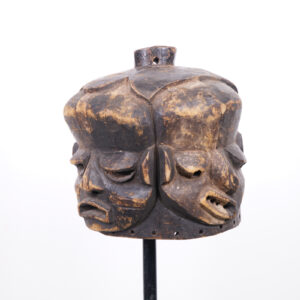Historically, the Pende originated in modern-day Angola, between the Atlantic Ocean and Cuanza River. They migrated in the 1600’s to their present location due to the development of the Kingdom of Lunda. Ethnically, only roughly 250,000 people consider themselves to be Pende. That is considerably less than that of neighboring tribes. Even so, the Pende are then divided into two separate cultural groups: The Eastern Pende and Western Pende. Although they are two distinct people, they consider themselves to be part of the same ethnic group.
The Pende do not follow a typical chieftaincy, but instead are organized around extended family groups. Some areas do have chiefs, but they do not hold serious authority. Family plays a huge role in their culture in which they are a matrilineal society. Typically, the eldest maternal uncle takes the position of the head of the family.
Ancestor worship is significantly importance to the Pende people. Appeasing the ancestors (mvumbi), is accomplished through rituals and offerings, usually provided by the head of the family. If neglected, it is believed that the ancestors will cause sickness and hardship to the household. When asked for help, a diviner will regularly demand offerings be made to a wooden sculpture to placate the provoked ancestors.


